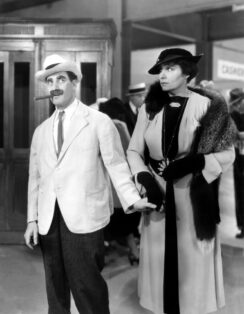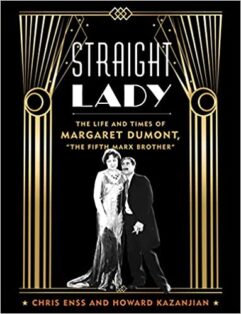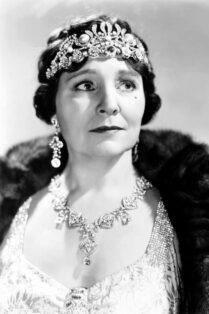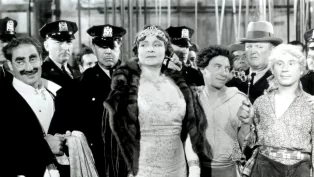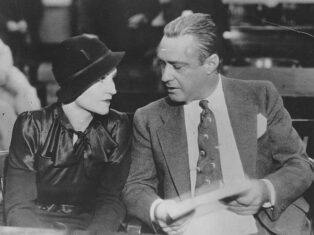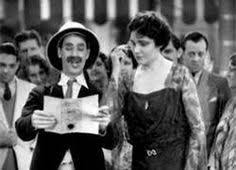Enter now to win a copy of
Straight Lady:
The Life and Times of Margaret Dumont, “The Fifth Marx Brother”
It was Groucho’s idea to recreate a scene from Animal Crackers on the television variety show The Hollywood Palace in the spring of 1965. When he contacted his aged costar, Margaret Dumont happily agreed to take part in the broadcast. She graciously accepted Groucho’s invitation to come to his home to rehearse the scenes from the movie they perfected in 1929. The pair reminisced for a few moments before practicing the piece to be performed, a reprise of Hooray for Captain Spaulding. The taped recording of Margaret and Groucho’s routine was aired on national television on April 17, 1965.
The actress, often referred to as the fifth Marx Brother, and the celebrated, caustic comedian she’d shared the stage with numerous times before, delivered their lines just as they did many years prior. Groucho adlibbing to draw out the audience’s laugh and Margaret reacting to his quips with raised eyebrows and stoic disregard. The well received broadcast was bittersweet for Marx Brothers devotees. Margaret had passed away five weeks before her sketch with Groucho was shown on the American Broadcast Company network.
“Margaret Dumont was the epitome of the word trouper,” Groucho told reporters. “She gave her all to the business she loved even to the last. It is possible that she wasn’t well even as we taped the show. However, she was so delighted at the prospect of repeating a sketch of ours, which has oftentimes been labeled classical, that she would never have let us know.
“It has been a pleasure beyond words over the years to work with Miss Dumont and to have been with her before an audience, which was a great part of her life, even until the last curtain.”
The statuesque comedy star who perfected the role of austere dowager, died of a heart attack at her home in Los Angeles on March 6, 1965. A private service was held for Margaret at the Chapel of the Pines Crematory in Los Angeles. Film critics and fans alike remembered her as “the greatest grande dame in the business.”
Milton R. Bass columnist and entertainment editor for the Berkshire Eagle paid tribute to Margaret in the March 16, 1965, edition of the publication. It is recognized as the most fitting of all salutes to the actress and her work.
“They don’t make comedies like that anymore. The recent death of actress Margaret Dumont at the age of seventy-five brought to mind all those marvelous Marx Brothers movies that pop up now and then on the television screen. Hollywood is now going through a farcical circle (in more ways than one), but they have nothing to compare with the wild gambolings of the madcap Marxes in their days of pristine glory.
“And no small portion of their success was due to Miss Dumont who played, nay, who was THE aristocratic grand dame of society. Mistress of the most elegant bosom and haughtiest stars in film history, Miss Dumont would throw back her head and peer through those lorgnettes as though she were throwing laser beams at those nuts who were tearing her house to shreds or making the ball of the year seem like a rumble between the Jets and the Propellers.
“She was always the victim of Groucho’s amorous greed, but she always submitted with such grace and dignity that an added dimension of humor was added to a preposterous situation. Everyone has his favorite Dumont-Groucho scene, but my very favorite of all took place in a dilly titled A Day at the Races. Groucho played Dr. Hugo Quackenbush, a phony M. D. who was treating Miss Dumont for a nonexistent disease while bleeding her financially. Finally, she has had enough, and she goes to a legitimate doctor who takes X rays that prove she is in perfect health.
“She confronts Groucho at the racetrack with the doctor’s report, which he pooh poohs. Triumphantly she pulls out the X rays and flourishes them as the coup de grace. For the first time in his innumerable movies, Groucho is taken aback. Has he at last been shown in his true colors? There is that marvelous moment of silence as the devious mind works behind those shifty eyes. Finally, it comes. ‘Who are you going to believe?’ he demands. ‘Me or those crooked X rays?’ Miss Dumont caves in defeat.
“And then there was the time in Animal Crackers when Miss Dumont was trapped into a bridge game with Harpo as an opponent. He triumphantly made a grand slam by playing thirteen aces. It was something to watch her face as each ace after number four appeared, but she never lost her dignity and went down to defeat with a stiff upper half that would have done honor to a very, very, very Lord High Admiral.
“Once you start thinking about Marx Brothers gags you can’t stop. There was the time in the train when Groucho was talking to somebody and Gummo went running past clutching an empty carton for oranges. Groucho looked reflective for a moment and then said: ‘I hate to send a kid up in an old crate like that.’ Completely devastating every flying film that had ever played.
“And then there was the classic court scene where prosecutor Chico was grilling Groucho on the witness stand. ‘What has four legs, a trunk in front and a tail behind?’ Chico wanted to know. The judge turned purple (in a black and white picture) and barked, ‘That’s irrelevant. That’s irrelevant.’ Whereupon Chico turned in bewildered hurt and said ‘No fair telling. Let him get it himself.’
“And can you forget that Night in Casablanca where Harpo was leaning against the building when the cop came up. ‘What do you think you’re doing,’ the cop asked, ‘holding up the building?’ Harpo nodded happily. ‘Move on, move on,’ the policeman ordered. And Harpo did and the building fell down in a spectacular display of plaster and dust.
“If I had to pick my list of ten favorite actresses, Miss Dumont would be right in there. She was no stooge or supporting player in the Marx Brothers films, but the other side of the scale, the balance wheel that pulled their absurdities into a proper perspective. There, is no one of such stature in the field of comedy today. Jack Lemmon strikes his own balance by a split in character, but all the other comic characters lack a Dumont in their lives. Consequently, the days of mad splendor are gone. Expect for such things as Peyton Place on television. Oh, how that series cries for Margaret Dumont to give some belly to the laughs.”
Groucho Marx paid homage to Margaret’s talent at the Academy Awards ceremony in 1974 when he was presented with an Honorary Oscar. “I want to thank those that voted for me to get this award,” he told the celebrity audience. “I wish that Harpo and Chico could be here to share it with me, this great honor. I wish Margaret Dumont could be here too.” At that statement, the audience applauded. “She was a great straight woman for me, even though she never understood my jokes….”
Funny man Groucho Marx died on August 19, 1977, at the age of eighty-six. He had written his epitaph himself which read, “I hope they buried me near a straight man.”
The Marx Brothers, with Margaret Dumont by their side, mastered a comedy approach no one had seen before of have been able to duplicate since. The Marx Brothers were an ensemble group, but Groucho was the star. One reporter wrote of the star, “Too bad he never played Hamlet. I’d have loved to see him upstage the ghost of Hamlet’s father and sell Denmark to Margaret Dumont.”
